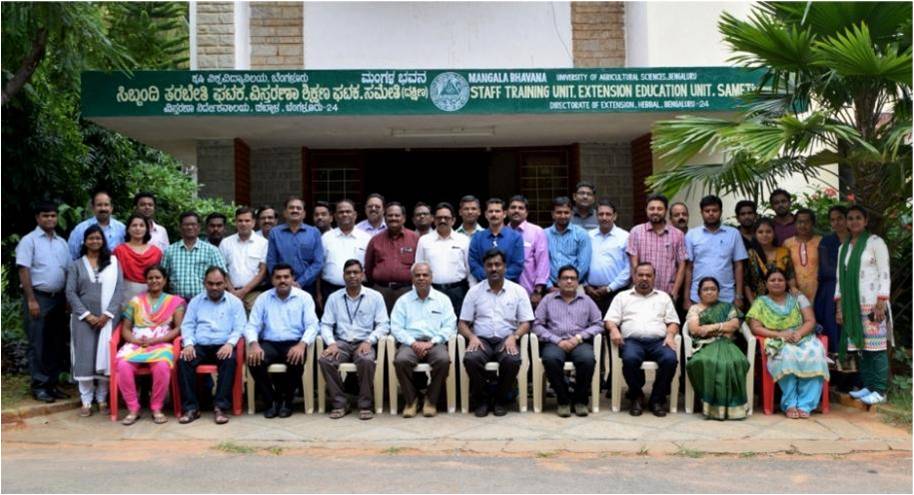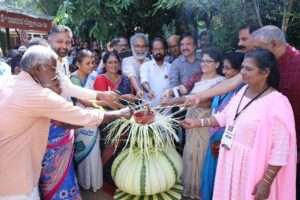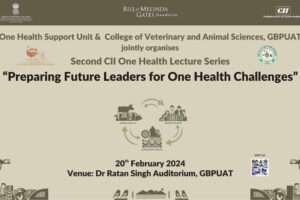 MANAGE and UAS-B jointly organized a training programme on
MANAGE and UAS-B jointly organized a training programme on
Navigating ICTs for Agricultural Extension from 08-12 August 2016 at UAS, Bengaluru. Smitha, S., Sowjanya, S., and Karthik, D. participated in this training and they share their experiences here
THE CONTEXT
Dialogues in development are not anymore about the importance of ICTs. Conversations are more about the ways to tap into the potential of ICTs. India has promoted several ICT-based initiatives in agriculture targeting farmers. But to realize the full potential of ICTs in agricultural development, ICTs should target not only farmers but bring together the whole spectrum of actors in agricultural innovation systems (AIS) on the same platform. The training programme “Navigating ICTs for Agricultural Extension” was aimed at developing capacities of those engaged in agricultural extension. Thirty-two participants across the country from different fields and disciplines participated in the five-day training programme.
THE PROGRAMME
Presentations
 Dr. R. Saravanan, Director (Agricultural Extension), MANAGE welcomed the trainers.
Dr. R. Saravanan, Director (Agricultural Extension), MANAGE welcomed the trainers.
Dr. K. Jagadeeshwara, Director of Extension, UAS, Bengaluru, in his address highlighted the growing importance of ICTs in agriculture.
Dr. R. Saravanan, in his introductory presentation talked about the farmers’ information needs and how ICTs can address these needs. He also talked about the current challenges in enhanced use of ICTs and the major ICT applications (Mobile-SMS, Web portals, Call centres, Digital videos, m Apps). These applications not only help farmers but also the other stakeholders to access and share information on a single platform. In another lecture, Dr. Saravanan also talked about the use of social media in agricultural extension drawing lessons from a number of Facebook and WhatsApp groups which are supporting farmers and agricultural extension staff. He also presented on the ICT initiative e-arik which was implemented in Arunachal Pradesh.
Shared understanding and Experience Sharing
The power of conversation is so invisible and natural that we usually overlook it. A session was started by World Cafe Conversation to create a living network of collaborative dialogue. “World Café” is a structured conversational process intended to facilitate open and intimate discussion, and link ideas within a larger group to access the collective intelligence or collective wisdom in the room. Participants were divided into four cosmopolite groups and each group was assigned with pre-assigned issues such as, ICT initiatives, Good Practices in ICT, Challenges for Extension in ICT initiatives and Challenges faced by farmers. Each group has to sit around a table and hold a series of conversational rounds lasting for 20 minutes about the specific issues posed. At the end of each round, two persons remains at each table as the host, while the others travel to separate tables. Table hosts welcome newcomers to their tables and share the essence of that table’s conversation so far. The newcomers relate any conversational threads they are carrying and then the conversation continues, deepening as the round progresses. By providing opportunities for people to move in several rounds of conversation, ideas, questions, and themes begin to link and connect. There were three such sub–sessions with 10 minutes each. At the end of the third round, the entire four groups were cross pollinated with insights and discoveries. The session helps to bring out various aspects of ICT projects and issues, while implementing the ICT projects. The groups emphasized the call for need-based and farmer-friendly ICT tools. Moreover, the session helped to bring an overall outlook of various ICT initiatives in different states and new ICT concepts through collaboration and critical thinking.
 Dr. N.R. Gangadharappa, Director of Research, UAS Bengaluru, while addressing the participants emphasized the need for developing capacities among extension staff to use ICTs. Mr S.V. Mohanasundaram, Project Engineer III, IoT Group, C-DAC, Bangalore, made a presentation on Internet of Things for Agriculture. He explained the working of sensors and LoRa technology (Long Range Radio). It is a wireless technology. With its low power wide area network, it is expected to connect 50 billion devices. He pointed how this LoRa technology can be made useful for agriculture and allied sectors. For example LoRa technology can be used for farm vehicle tracking, water storage tank and fuel tank monitoring, livestock monitoring etc.
Dr. N.R. Gangadharappa, Director of Research, UAS Bengaluru, while addressing the participants emphasized the need for developing capacities among extension staff to use ICTs. Mr S.V. Mohanasundaram, Project Engineer III, IoT Group, C-DAC, Bangalore, made a presentation on Internet of Things for Agriculture. He explained the working of sensors and LoRa technology (Long Range Radio). It is a wireless technology. With its low power wide area network, it is expected to connect 50 billion devices. He pointed how this LoRa technology can be made useful for agriculture and allied sectors. For example LoRa technology can be used for farm vehicle tracking, water storage tank and fuel tank monitoring, livestock monitoring etc.
Dr. V. Veerabadhraiah, former Director of Extension, UAS, Bengaluru, addressed the participants and articulated the need for integrating traditional approaches in extension with advances in ICTs. Mr. Prabhav Garudadhwajan, young entrepreneur, who won 14 national awards and founder of ‘easy Krishi’, explained the working model of Easy Krishi. They have Aadhaar-based farmer registration and information is shared through ‘Digital Communication Channel’, which is based on voice and not on internet. The message will be based on need of farmers or on some emerging issues in the areas like pest attack, diseases etc. One boy with a smart phone and internet connection is assigned to each village; he will meet and advise the farmers about pest/disease outbreak, marketing the produce, etc. He also mentioned the importance of planning in agriculture, which helps to avoid distress sale by farmers. Further, he demonstrated the working of easy krishi.
Experience sharing by participants
Dr. Sudhir Panchbhai, Department of Animal Husbandry Gariyaband, Chattisgarh, shared his thoughts about the use and impact of social media and also some of the positive and negative effect of media. Mr. Salin Thapasi, Agricultural Officer, Department of Agriculture, Kerala, had a presentation on the topic “Harnessing the power of social media for agricultural development – the Kerala Experience”. He highlighted the efforts of Kerala Government to nurture the social media ecosystem in Kerala. The officers of Agriculture Department is receiving incentives for using and promoting social media for extension. He also highlighted how the government services in the state have transformed into the emode. Through active Facebook pages, Agriportals and WhatsApp groups farmers are effectively organized through social media.
Dr. Subhra Chanda, Scientist, CSRTI from Berhumpore, West Bengal shared details of Sericulture and Mulberry cultivation, prospects, problems and thrust areas.
Dr. Harinder Singh, Deputy Director (Training), Krishi Vigyan Kendra, Punjab Agricultural University explained different initiatives of KVK Ropar like Daily update, radio talk, WhatsApp, expert systems for rice and CDs.
Ms. Rajni Agashe, SMS, Agricultural Extension from KVK, Surguja, Indira Gandhi Krishi Vishwavidyalaya , Raipur, Chattisgarh talked about the ICT initiatives of her institution. She also highlighted her research findings on level of application of various ICT tools by farmers.
Dr. Basab Bhattacharya, Assistant Director of Agriculture, West Bengal, shared his experience with ICTs. He pointed out the success story of matirkatha, web portal developed by Government of West Bengal, which is used to disseminate technology and information like mandi price, weather information, farm calculator, Departmental news etc.
Mr. Nilambar Kilaka, Deputy Director of Fisheries, Orissa gave details on the ICT initiatives of State Department of Orissa.
Dr. C. Kathiresan, C-DAC Hyderabad delivered a lecture on Vikaspedia – the “multilingual one-stop knowledge portal” that targets specific country needs for achieving an inclusive social development. It catalyses the use of ICT for collaboration and knowledge sharing among development stakeholders. He also explained the approach, products and services of Vikaspedia. A presentation on “Harita-Priya”- A wireless sensor networks based precision agriculture model for sending personalised agro-advisories to farmers was made by him. The project Harita-Priya won International Telecommunication Award at World Summit of Information Society, ITU, United Nations, Geneva, 3 May 2016.
Mrs. Shashikala Ravikumar, Iffco Kisan Sanchar Limited (IKSL), presented on m-Extension initiative by IKSL and how it provides timely information to Indian farmers. She explained Value Added Services provided for farmers through the Green SIM Card of IKSL which include five free voice messages every day. Each voice message is of one-minute duration and cover diverse areas like soil management, crop management, dairy and animal husbandry management, horticulture and vegetable crops, plant protection, market rates, weather forecasts, human and cattle health, employment opportunities, government schemes, etc. The subscribers of Green SIM Card of IKSL have the privilege of access to a dedicated Helpline service through a 6-digit number 534351. Farmers can get a solution to their problems from experienced professionals by using this number. She also explained the technical aspects of message planning and delivery, content quality audit and different aspects of Iffco Kisan App.
Mr. Kumar, Senior Project Officer, C-DAC, Hyderabad, made a presentation on e-learning, mlearning and android apps for agriculture. He discussed the functioning of the current elearning platforms, web portal and mobile applications available to reach farming communities and emphasized that content development is the most important step in any e-learning platform.
Dr. G.R. Pennobaliswamy, Professor (Agricultural Extension), SAMETI(S), UAS, Bengaluru delivered an interactive session on ‘Whatsapp conversation of KVK Kodagu Farmers Group & DAESI Davanagere’, where he highlighted the use of social media and WhatsApp in solving farmers need and problems. Dr. Nadagouda, Digital Green, Bengaluru, talked about Digital Green and how digital videos are used for promoting new knowledge on agriculture. He also demonstrated on how videos are edited.
Dr. Shaik N. Meera, Principal Scientist, ICAR- Indian Institute of Rice Research; Hyderabad in his presentation provided an overview of ICTs in Indian Agriculture and explained how the future ICT applications should converge with the ongoing Government initiatives like Digital India.
Dr. Ganesamoorthi, (Assistant Professor) UAS, Bengaluru delivered a presentation on “Google Forms: A Simple Application for Effective Survey and Monitoring”. He demonstrated how to create Google forms and how it can be used for Research, Evaluations etc.
Visits
Participants visited the National Bureau of Soil Survey and Land Use Planning (NBSS&LUP), Regional Station, Bengaluru. Dr. S. Srinivas, Senior Scientist talked about application of remote sensing and GIS for soil resource mapping. It helped the participants to have a thorough understanding on the use of Remote Sensing Imageries, which helps in deciding level of management on soil erosion, alkalinity, depth and improving water holding capacity of soil and enhancing the productivity of soil.
The participants visited the Rashtriya eMarket Services (ReMS), Bengaluru, for studying its functioning and organisational setup. ReMS, is a joint venture company between the Government of Karnataka and the NCDEX Spot Exchange Limited and is aimed at implementing the Agricultural Marketing Policy to bring in efficiency and transparency in the agricultural marketing system for efficient price discovery to benefit farmers and other market participants. The CEO & MD Manoj Rajan addressed the participants.
Valedictory
The session started with a recap of the whole training programme and collection of feedback from the participants. Participants shared their perspectives and experiences from the training programme and also pointed how they can imply the learning experiences in their work environment. Dr. K. Jagadeeshwara, Director of Extension, Dr. N.R. Gangadharappa, Director of Research, GKVK, UASB, Bengaluru and Dr. G.M. Varadaraju also addressed the participants. Dr.Ganesamoorthi, UASB, Bengaluru, Training Co-ordinator extended the gratitude to all who played a crucial role in making the programme effective. The Valedictory session ended with distribution of certificates to the training participants.
OUR OBSERVATIONS
- The expectations of participants were also collected on day 1 through a card exercise and these were used as a guide in planning other sessions in the coming days.
- The training adopted various learning approaches which included, presentations, card exercises, group exercises, world cafe conversations, trying online registration to different Agri-portals, creation of mobile apps and visit to ICAR-NBSS&LUP and Rashtriya eMarket Services, Bengaluru.
- The expert lectures covered different aspects of ICTs — social media for Agricultural Extension, Internet of Things for Agriculture, m-learning and Android apps for agriculture, Google Forms, Digital Videos for Agricultural Development, and Digital Extension Approaches
- Young research scholars were given the opportunity to participate in the programme as the social media reporters cum facilitators.
- There were sessions on exploring the experience by the participants with use of ICTs in their organizations.
- Personnel at the Staff Training Unit, UAS, Bengaluru, organized very good accommodation and food for participants.
- Detailed feedback from the participants was collected at the end of the programme regarding various aspects like relevance, coverage and style of the training. This is expected
to help the organizers to review the training holistically and make needed changes to improve the content and methodology in similar trainings elsewhere.
FINAL REMARKS
The five-day training programme helped the participants to explore the different ICTs and convinced them to explore these in their work environment to organize and provide better services to farmers. The programme covered different aspects of ICTs from basic e-initiatives to advanced LoRa technology and Internet of Things in Agriculture.
Dr. Sudhir Panchbhai, Department of Animal Husbandry, Key Village Scheme, Gariyaband, Chattisagarh, noted that after coming to this training programme his perception about ICTs has changed. Miss. Joycy Rani Dasari, Scientist, CSTRI, Central Silk Board, Srirampura, Mysuru, mentioned that she would be able to use the knowledge of ICTs in the field of sericulture which currently lacks any portal or mobile apps.
Ms. S. Smitha and Mr. D. Karthik are PhD Research Scholars of Southern Research Station of
ICAR-NDRI, Bangalore and Ms. S. Sowjanys is a PhD Research Scholar, Department of Agricultural Extension, UAS Bangalore. They could be contacted at smithasiva88@gmail.com ; karthik.dharamkar@gmail.com; and souju.janya@gmail.com respectively.





Add Comment